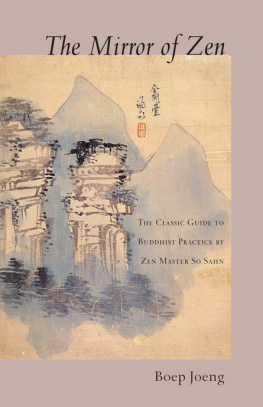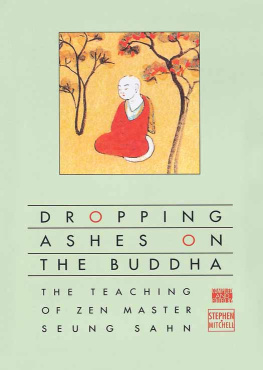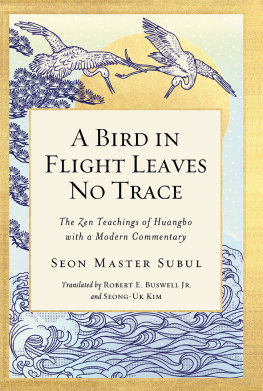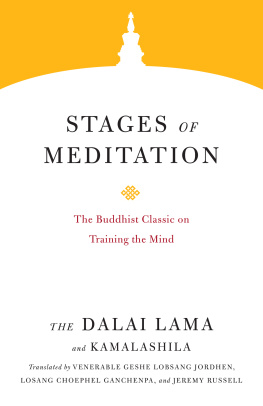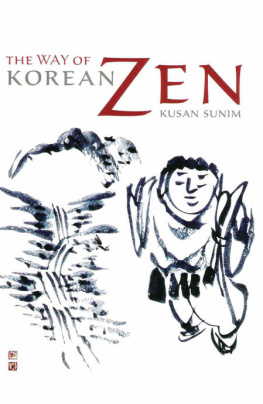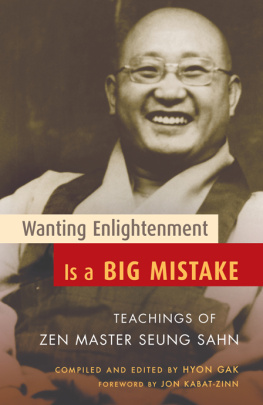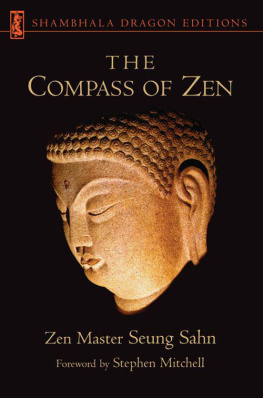ABOUT THE BOOK
The sacred radiance of our original nature never darkens.
It has shined forth since beginningless time.
Do you wish to enter the gate that leads to this?
Simply do not give rise to conceptual thinking.
Zen Master So Sahn (15201604) is a towering figure in the history of Korean Zen. In this treasure-text, he presents in simple yet beautiful language the core principles and teachings of Zen. Each section opens with a quotationdrawn from classical scriptures, teachings, and anecdotesfollowed by the authors commentary and verse. Originally written in Chinese, the text was translated into Korean in the mid-twentieth century by the celebrated Korean monk Boep Joeng. An American Zen monk, Hyon Gak, has translated it into English.
BOEP JOENG is a Korean Zen monk, a writer, and a translator of Buddhist texts. In his native Korea, he has written widely about meditation, social justice, environmentalism, and nonmaterialism.
Sign up to learn more about our books and receive special offers from Shambhala Publications.

Or visit us online to sign up at shambhala.com/eshambhala.
The Mirror of Zen
The Classic Guide to Buddhist Practice by Zen Master So Sahn
Translated from the Chinese by
Boep Joeng
Translated from the Korean by
Hyon Gak

Shambhala
Boston & London
2012
Shambhala Publications, Inc.
Horticultural Hall
300 Massachusetts Avenue
Boston, Massachusetts 02115
www.shambhala.com
COVER ART: Diamond Mountain Prospect by Joeng Soen, circa 1755.
Korean edition copyright 2003 by Boep Joeng Sunim; English translation copyright 2006 by Paul Muenzen
All rights reserved. No part of this book may be reproduced in any form or by any means, electronic or mechanical, including photocopying, recording, or by any information storage and retrieval system, without permission in writing from the publisher.
Library of Congress Cataloging-in-Publication Data
Ssan Taesa, 15201604.
[Snga kwigam. English]
The mirror of zen: the classic guide to Buddhist practice by zen master So Sahn/translation from Chinese to Korean by Boep Joeng: translated from Korean to English by Hyon Gak.
p. cm.
eISBN 978-0-8348-2641-0
ISBN-13: 978-1-59030-384-9 (pbk.: alk. paper)
ISBN-10: 1-59030-384-9
1. Zen BuddhismEarly works to 1800. I. Ppchong. II. Hyngak, 1964. III. Title.
BQ9265.S66713 2006
294.3927dc22
2006014804
Contents
The present translation of The Mirror of Zen is the first complete version of this timeless classic to appear in English in the West.
If you were to comb the mountains and valleys of Korea, polling every meditating monk and nun and hermit and ascetic as to the most necessary, essential, inseparable compendium of teachings apart from the Buddhas sutras themselves, chances are that most of them would choose The Mirror of Zen. It is by far the most quoted, most cited, most referred-to text in the tea rooms and teaching halls of the Zen temples in Korea. Nuns and monks will often have an old master write one of its famous verses in flowing calligraphy, to paste on the wall of their ascetic hut, or to give to a fellow meditator as a precious gift to spur their practice. Like every Korean monk and nun, my own teacher, Zen Master Seung Sahn, was deeply influenced by Master So Sahns teachings: the exhortations and stories from this text abound in his talks. And when Zen Master Seung Sahn arrived in America, one of the first things he attempted to accomplish was to encourage one of his close students to translate this work. (It was never completed.) His own book, The Compass of Zen, is a direct, even conscious spiritual descendant of The Mirror of Zen, explicitly sharing both its intent, compactness, and even structure. For centuries, The Mirror of Zen has been used in Japanese and Chinese Zen halls by adepts who have come to learn of its pithy directives to practice.
Being neither a scholar nor a professional translator, I would never in my right mind have had the audacity to so finger such a venerated text. The undertaking was urged, instead, with great gentle force by the Venerable Boep Joeng, a Zen monk, activist, poet, and by all accounts the most revered living spiritual figure in any religion in modern-day South Korea. His own version of The Mirror of Zen, translated several decades ago from classical Chinese into vernacular Korean, had recently been selected by the Korean government to represent prominent works of Korean arts and letters at the Frankfurt Book Fair in Germany. His own translation is regarded as the best rendering from Chinese into a vernacular language, and my translation looks through the eyes of his own translation to bring The Mirror of Zen into English.
So, for the record, those with more training in the field of Chinese or Buddhist classics might need to know how someone with no scholarly preparation in the field came to translate a work of such a stature as The Mirror of Zen.
One day in March 2004, I was told that Venerable Boep Joeng Sunim requested a meeting at Gil Sang Sah, a temple in north central Seoul. At the time I was the guiding teacher of the Seoul International Zen Center at Hwa Gye Sah Temple, and secretary attending upon my teacher, Zen Master Seung Sahn. Would I be able to translate this work into English, to help introduce it to the world?
Complain though I may of my ignorance of Chinese characters, and a competing inadequacy in written, much less literary, Korean, Boep Joeng Sunim would have nothing of it. Just kneeling in the presence of this great monk, or having any kind of audience with him, is a singularly rare experience. He stubbornly refuses frequent visits to the city, preferring instead his rundown shack located nowhere in the mountains. He has also adamantly refused to permit his own writings to be translated into English, perhaps because he knows it would bring increased international renown into his austere spiritual life.
With his main student quietly serving delicately scented green tea beside us, it was unimaginably difficult to escape this request. The burden of translating Boep Joeng Sunims voice was one huge imponderable, but looming so vastly behind it, like a great, towering peak poking distantly through the mists of a formidable range, was Master So Sahn himself. And this was his seminal work. And I am just a Zen monk, a New Jerseyborn American one at that, blatantly deficient in practice and virtue, and one who hasnt studied a spot of classical Chinese.
As I desperately ticked off the names of several people far more qualified than me to undertake this responsibility, to each one Boep Joeng Sunim only shook his head. His lips pursed tightly as the list lengthened. And it was from this moment that the rationale behind his gentle obstinacy became clear: Not just anybody can translate this book and get Master So Sahns true meaning, he said. The people you mention are not practicing people. Each one of them might be qualified in this way or that with words, and maybe understand English. But they do not practice meditation. Only one who really practices meditationand even better, a meditation monk, who commits body-and-soulcan touch this teachings true meaning. And so much better if that monk truly practices correctly.
So, Boep Joeng Sunims concern has been with meditationpure and simplenot intellectual preparation. For him, the inner meaning of this work for meditators was supreme, far more so than the scholarly rightness of a conservative, rigid translation. Some six months into the project, after encountering numerous situations wherein I realized that a merely literalistic, word-forword Chinese-to-Korean-to-English rendering would not only be boring and insufficient, but even miss entirely, on many essential points of teaching, Master So Sahns subtle and profound meanings, I again approached Boep Joeng Sunim. To which approach should I hew, and still have his confidence in my efforts?
Next page
